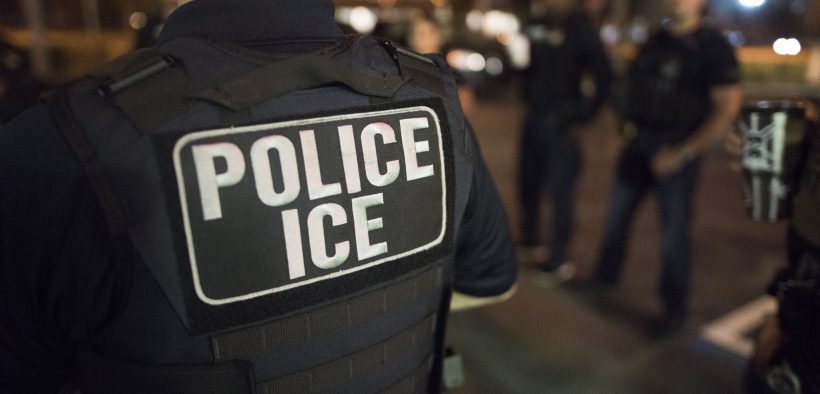Consulting Firm McKinsey Advised ICE To Cut Food, Medical Care

“The consultants, three people who worked on the project said, seemed focused solely on cutting costs and speeding up deportations — activities whose success could be measured in numbers — with little acknowledgment that these policies affected thousands of human beings.”
International consulting firm McKinsey & Company advised Immigration and Custom Enforcement’s (ICE) immigration policy with recommendations so extreme that some ICE employees considered them inhumane, according to a new investigation by ProPublica based on 1,500 pages of documents obtained through the Freedom of Information Act and interviews with people who worked on the project.
McKinsey’s Work With ICE
The prestigious firm, which was brought on during the Obama administration, recommended cuts in spending on food, medical care, and supervision for migrants, as well as ways to speed up the deportation process that some ICE employees worried would violate due process protections.
“The consultants, three people who worked on the project said, seemed focused solely on cutting costs and speeding up deportations — activities whose success could be measured in numbers — with little acknowledgment that these policies affected thousands of human beings,” writes ProPublica.
“The consulting firm’s sway at ICE grew to the point that McKinsey’s staff even ghostwrote a government contracting document that defined the consulting team’s own responsibilities and justified the firm’s retention, a contract extension worth $2.2 million,” wrote the report. “Can they do that?’ an ICE official wrote to a contracting officer in May 2017.”
Some critics argued the revelations reflect the broader problem in the border-industrial complex of private prison corporations and other federal contractors that make massive profits from the immigration crackdown.
“NO ONE should be getting rich off of depriving people of their liberty or their lives,” tweeted former Texas Rep. Beto O’Rourke. “McKinsey, GEO Group, CCA/CoreCivic, etc all have a profit incentive to deport, detain, dehumanize. Lets get corporations completely out of immigration and criminal justice.”
McKinsey is one of the federal government’s top contractors, with federal contracts worth $613 million between 2012 and 2018. Notably, the General Services Administration’s inspector general recently recommended the cancelation of multiple McKinsey contracts, arguing that improper pricing with the firm may be costing the U.S. $69 million a year.
McKinsey’s Global Influence
As a former McKinsey employee wrote with Current Affairs, the international consulting firm has been instrumental in spreading modern globalized capitalism throughout the world:
“The biggest, oldest, most influential, and most prestigious of the “Big Three” management consulting firms, McKinsey has played an outsized role in creating the world we occupy today. In its 90+ year history, McKinsey has been a whisperer to presidents and CEOs. McKinsey serves more than 2,000 institutions, including 90 of the top 100 corporations worldwide. It has acted as a catalyst and accelerant to every trend in the world economy: firm consolidation, the rise of advertising, runaway executive compensation, globalization, automation, and corporate restructuring and strategy.”
Critics argue that McKinsey’s client-first philosophy allows it to justify recommendations that benefit its business partners while hurting broader society. For example, the firm advised Purdue Pharma on how to “turbocharge‘ sales of OxyContin, how to counter efforts by drug enforcement agents to reduce opioid use, and were part of a team that looked at how ‘to counter the emotional messages from mothers with teenagers that overdosed’ on the drug,” according to the Massachusetts attorney general’s lawsuit against Purdue.
While other multinational corporations distanced themselves (temporarily) from the Saudi monarchy after the execution and dismemberment of journalist Jamal Khashoggi, McKinsey remained a steadfast partner of the Kingdom, advising the privatization of state-oil company Aramco among other issues. In 2015, the firm came under scrutiny for using Twitter analytics to help the Saudi regime crackdown on dissidents.
“Public disclosures do not include the many projects McKinsey does for America’s defense contractors,” wrote the former McKinsey worker with Current Affairs. “Many of these projects are benign, bordering on banal, but some of them help organizations that make the bombs blowing up Yemeni school buses.”
McKinsey was also fiercely criticized last year for its part in a massive corruption scandal in South Africa that prompted the resignation of the country’s former prime minister, Jacob Zuma.
Relevance In 2020 Election
Notably, 2020 candidate Pete Buttigieg is a former employee of McKinsey:
“Buttigieg was a McKinsey employee from 2007 to 2010, but his consulting record there, with time spent in Iraq and Afghanistan, remains a company secret ‘largely covered by a non-disclosure agreement,'” writes Sludge, a site that tracks corporate lobbying and corruption. “In late October, Buttigieg distanced himself from McKinsey’s track record as a champion of economic privatization and a leading adviser to authoritarian governments like China, Saudi Arabia, Ukraine, and Turkey.”
Progressive critics argue that Buttigieg’s past at McKinsey, his reliance on wealthy donors, and his opposition to structural reforms that would limit the power of big tech and big insurance companies indicate that he would not meaningfully impact the status quo if elected president.
Sen. Elizabeth Warren, who has called on Buttigieg to release his list of former clients, also has ties to the firm. During her time at Harvard Law School, Warren directed a $800,000-$1 million McKinsey study for “long-term development” that critics say produced recommendations, such as class-size reduction, that could have been found through a quick internal survey. The Washington Examiner notes that at the time of McKinsey’s contract with Harvard Law in 1999, Warren’s daughter was concluding three years of work at the firm.













